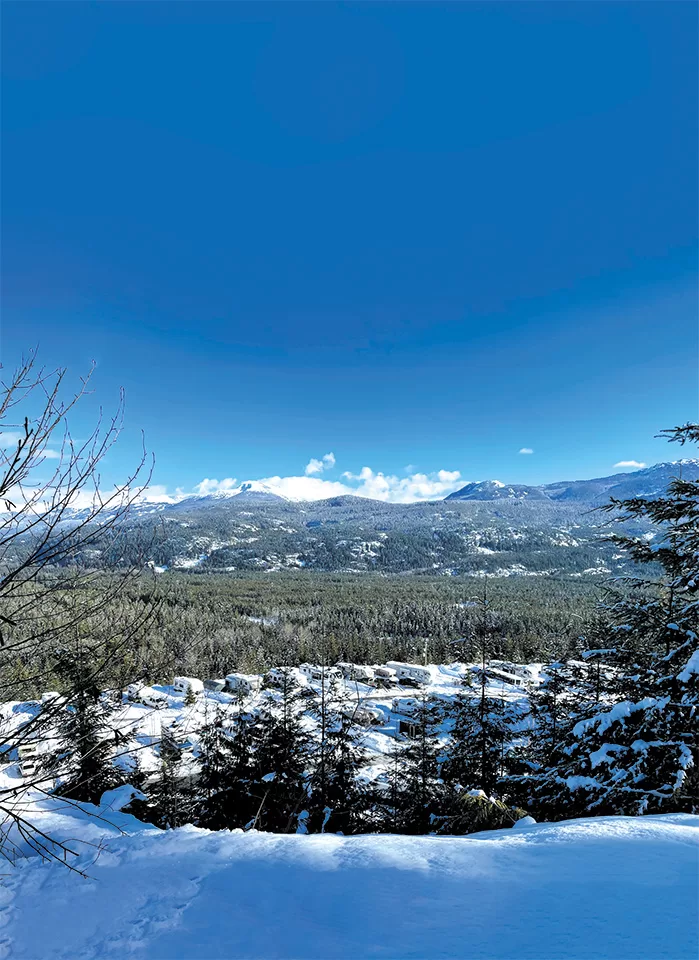Located in the westernmost part of Canada, this province is a prime winter destination for RVers.
By Jan Lee
December 2022
For many RVers, a winter excursion can mean only one thing: an opportunity to head to warmer climates. Destinations like Baja California, south Florida, or the California coast have become perennial favorites for RVers looking to escape the doldrums of staying at home during a rainy, gray winter. But an increasing number of travelers are discovering that RVing isn’t just for warm-weather vacations; in fact, it’s an ideal way to enjoy snowy destinations, too.
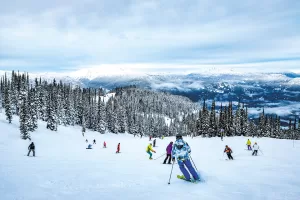
Whistler Blackcomb resort.
New technological advances in RV construction are changing how — and where — we travel. Better-insulated vehicles, sturdier appliances, improved ergonomic designs, and add-ons that help keep water heaters and hoses from freezing are making it possible for RVers to head to winter destinations in places such as western Canada.
Of course, a well-built RV is only part of what is needed for a safe and successful winter sojourn. Planning, up-to-date equipment, and common-sense procedures are mandatory for snow camping, especially if you intend to winter over until spring. Most winter RVers hit the road with a base camp in mind and a travel itinerary that allows them to winterize for comfort and settle in before snow arrives.
Winter RVing, Canadian Style
Canada’s west coast province, British Columbia, is a magnet for winter RVers. Its mountain ski resorts host their fair share of Canadian snowbirds from the eastern provinces each year. But even RVers from Edmonton, Alberta, and Winnipeg, Manitoba — places that often see temperatures plunge below zero degrees Fahrenheit — come to British Columbia prepared for winter conditions with good tires that can traverse mountain passes and icy roads. They also arrive with either the preparatory tools for winterizing their RV at the campsite or a cheat
sheet of what they need to buy when they get to the site ahead of winter weather.
Here are some suggestions for assuring that your RV is winterized for snow camping:
Winter tires that are able to traverse mountain passes. Winter tires not only are preferred on most British Columbia highways and all mountain passes between October 1 and April 30, but they also are required by law. There are two designations: mud- and snow-rated tires (M+S) and winter tires with the mountain-snowflake insignia. The latter are preferred in icy conditions. Carrying a good set of chains for your vehicle(s) is always good practice as well. For more information, refer to https://bit.ly/3SDRdlE.
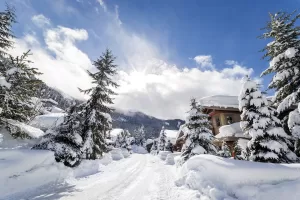
Alpine scenes worthy of a holiday greeting card abound in the Whistler area.
Pay attention to weather patterns for your route. There’s nothing more nerve-racking than arriving at your site in a snowstorm or having to pull over to wait it out. Familiarize yourself with weather patterns on your route before getting on the road. Being prepared will make your journey all the more enjoyable.
Insulate your RV before winter starts. Installing skirting around the base of your RV is essential to keeping in the heat. RVs that have an “Arctic package” (with an undercarriage heating system) may be able to do without some skirting, but for most, it’s essential for a comfortable stay. Having satisfactory insulation on your RV, as well as for your water and sewer connections, also will help to protect your water tanks and pipes.
“A lot of people don’t realize they need to wrap hoses in winter,” said Chloe Ripley, property manager for Whistler RV Park and Campground, located outside Whistler Blackcomb — British Columbia’s largest ski resort. She noted that she has seen plenty of examples of frozen pipes and tanks, and she pointed out that there are a number of ways to avoid the misery.
Many hardware stores carry low-voltage plug-in heating coils that you can wrap around your intake and outtake hoses. Pipe insulation also is helpful. A variety of products are available for insulating your RV, and the approach often depends on your particular vehicle and setup. Doing the research and purchasing in advance will save you time and money.
British Columbia Winter Destinations
So, where should you go? Part of the appeal of winter camping in British Columbia is its remarkable diversity of climates and terrain. You could go camping in arid terrain, close to wineries and fruit orchards. Or is coastal weather with city amenities nearby more your interest? Do you prefer to ski in deep powder snow, or would you rather experience winter with little snow at all? British Columbia is anything but a one-climate province.
Whatever your preferred winter terrain, be sure to book your RV site early, as some parks fill up. It’s worth noting that most of the towns mentioned below are popular winter destinations and have more than one park in the area.
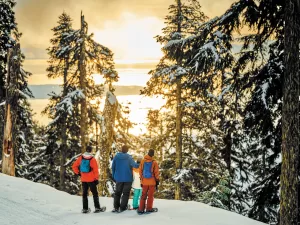
Snowshoeing can be enjoyed around Vancouver, including guided tours at Grouse Mountain Resort.
West Coast RV Parks
With its mild temperatures and proximity to the U.S. border and to skiing, British Columbia’s west coast is a favorite destination for those who like to be close to Vancouver’s city life. The coastal weather brings in the snow, but outlying campgrounds in the Fraser Valley generally receive less snow than rain.
Fort Langley RV Park sits about 40 minutes east of Vancouver, just off the Trans-Canada Highway in the historic town of Fort Langley. The small-town atmosphere makes this a return destination for many RVers. Skiing and snowboarding are a few hours away in several directions. The park offers short-term and six-month stays. U.S. Interstate 5 from Seattle connects you with the United States-Canada border and easy access to Fort Langley. Its sister campground, Agassiz-Harrison RV Park, is 90 minutes northeast of Fort Langley, eight minutes from Harrison Hot Springs, and surrounded by hiking and skiing opportunities.
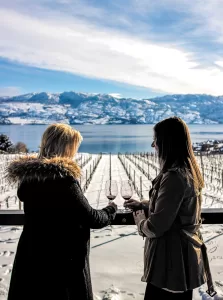
In the Okanagan Valley, Quails’ Gate Winery serves vintages with a view.
Okanagan RV Parks
The Okanagan Valley is known as British Columbia’s favorite wine country and is home to many fruit orchards. If deep snow isn’t your thing, this valley, British Columbia’s interior “playground,” may fit the bill. Located near the United States-Canada border, the Okanagan region is northwest of Spokane and the Orville, Washington, border crossing. RV campsites are more competitive here, as the weather is mild and often without snow — so, reserve early.
Apple Beach RV Resort is a small Okanagan campground set on the edge of a lake in the city of Oliver. It caters to RVers who prefer a quiet setting. Some sites face the lake, and all sites are full-service. The amenities are accessible to those with disabilities.
Gallagher Lake Campground, a Parkbridge Lifestyle Communities resort, is also in Oliver. It has about 140 sites and accommodates large RVs. The park offers short visits (under one month) and longer stays through the winter.
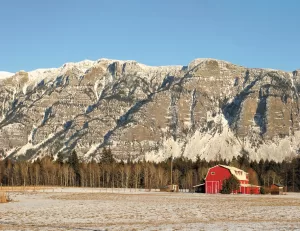
Scenic views are part of the Kootenay Mountains’ draw, along with skiing and hiking.
Kootenay Mountains
Set in skiing and hiking country, the town of Creston, on the eastern flank of the Kootenay Mountains, is made for RVers who don’t mind camping in a bit of snow throughout the winter. Campers tend to winter over in the Kootenays, arriving before the season starts in October or November. Creston’s frequently sunny winter weather keeps temperatures mild and is suited to outdoor recreation. For those coming from the United States, U.S. 95 from Coeur d’Alene, Idaho, takes you to the Porthill-Rykerts Border Crossing, which is 10 minutes from Creston.
Pair-A-Dice RV Park & Campground in Creston has a loyal following of snowbirds from eastern Canada. Even though it is a small facility with 44 sites, it often has availability during the winter. Pull-through sites can accommodate vehicles up to 65 feet. Snowfall can be around one to two feet at a time, but is usually less in this semi-dry climate. The management keeps the roads and the entrance well cleared.
Whistler Blackcomb
For true coastal mountain camping, heading to spots near Canada’s largest ski resort can be a mountain experience in itself. That may be one of the reasons so many RVers choose to winter over here. Seasonal snowfall in the area ranges around 10 to 13 feet per year and — yes, you guessed it — most of that is between October and April. Many British Columbia residents will tell you nothing beats the winter recreation opportunities at Whistler Blackcomb. Whistler is about 1.5 hours north of Vancouver on British Columbia Highway 99. U.S. I-5 connects you with the United States-Canada border 30 minutes south of Vancouver.
Whistler RV Park and Campground is set on the top of a mountain with spectacular views of the Coast Mountain range. The park caters exclusively to RVers during the winter months, and it has 90-plus sites. The Brew Mountain Café is operated on-site. Whistler Village is about 20 minutes away, and a second vehicle is advisable — otherwise you might want to utilize a taxi service to town.
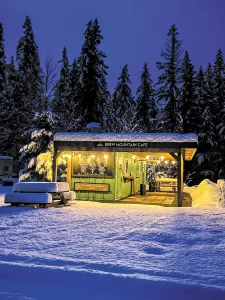
At Whistler RV Park and Campground, the Brew Mountain Café serves takeout meals during the winter .
Driving conditions up the mountain can be icy in the snow. Property manager Chloe Ripley advised having winter tires with a mountain snowflake rating: “We suggest inexperienced winter RVers not come with mud and snow tires.” Even though the park’s roads are maintained, it’s good to have a shovel on hand in snow country. Check the park website for other tips.
Riverside Resort, another RV park owned by Parkbridge, is about five minutes from Whistler Village, on the shores of Lost Lake. It has 60 sites open in the winter and can accommodate RVs/combinations up to about 50 feet in length. Access to the park is level, and the roads are well-maintained. Visitors tend to overwinter.
“Make your reservations as early as possible,” advised Jackie Paduano, senior communications specialist for Parkbridge Lifestyle Communities. “And understand that camping in Whistler in the winter is a lot different from camping in Vancouver or other warmer areas.” Enjoy the snow and the spectacular scenery — the trip is worth the winter preparation.
RV owners looking for a winter camping destination will find varied options in British Columbia. This land of diverse climates and terrain, beautiful scenery, and plentiful attractions promises an unforgettable stay for those who journey to western Canada.
Further Info
For general information about BC regions and specific destinations, contact:
Destination BC
www.hellobc.com
RV Parks
Fort Langley/Vancouver:
Fort Camping
www.pathfindercampresorts.com/locations/fort-langley
(866) 267-3678
Agassiz:
Agassiz-Harrison RV Park
www.pathfindercampresorts.com/locations/agassiz-harrison
(604) 335-2599
Oliver:
Apple Beach RV Park
www.applebeachrv.com
(855) 358-3287
Gallagher Lake Resort
www.parkbridge.com/en/resort/resort-detail/gallagher-lake
(250) 498-3358
Creston:
Pair-A-Dice RV Park & Campground
www.pairadicepark.com
(866) 223-3423
Whistler:
Whistler RV Park and Campground
www.whistlerrvpark.com
(604) 905-2523
Riverside Resort
www.parkbridge.com/en/resort/resort-detail/riverside
(604) 905-5533

